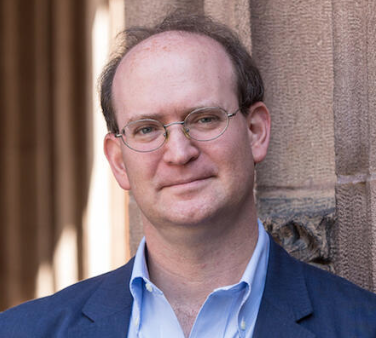You have /5 articles left.
Sign up for a free account or log in.

Joshua Katz
Princeton University
Princeton University’s Board of Trustees voted Monday to fire Joshua Katz, Cotsen Professor in the Humanities, effective immediately.
The university said in a statement that the dismissal followed an investigation initiated in February 2021 after Princeton received a detailed written complaint from an alumna who had a consensual relationship with Katz while she was an undergraduate under his academic supervision.
That relationship was the focus of a 2018 disciplinary proceeding against Katz, which resulted in a penalty of unpaid suspension in 2018–19 and three years of probation following his return, Princeton said.
The unnamed alumna did not participate in or cooperate with the 2018 disciplinary proceeding, according to Princeton. But when she came forward in 2021, she provided what Princeton called “new information,” triggering a new investigation. The second inquiry did not revisit the policy violations for which Katz was previously punished, according to Princeton: “It only considered new issues that came to light because of new information provided by the former student.”
“The 2021 investigation established multiple instances in which Dr. Katz misrepresented facts or failed to be straightforward during the 2018 proceeding, including a successful effort to discourage the alumna from participating and cooperating after she expressed the intent to do so,” the university said. “It also found that Dr. Katz exposed the alumna to harm while she was an undergraduate by discouraging her from seeking mental health care although he knew her to be in distress, all in an effort to conceal a relationship he knew was prohibited by university rules. These actions were not only egregious violations of university policy, but also entirely inconsistent with his obligations as a member of the faculty.”
Katz has previously denied that he engaged in any conduct beyond that for which he was suspended in 2018. He’s argued that Princeton wanted to fire him because of his political speech, including for a 2020 essay in Quillette which he referred to a Black student group as a “small local terrorist organization.” But Princeton’s dismissal announcement sheds new light on what the 2021 investigation was about; contrary to Katz’s public statement that he was being effectively retried for the same violations for political reasons, Princeton was now looking at a different set of allegations from the former undergraduate student herself, in part because Katz had (according to Princeton’s apparent findings) prevented her participation in the first investigation.
Free Speech and Faculty Responsibility
Princeton said the recommendation to dismiss Katz was reviewed by the faculty Committee on Conference and Faculty Appeal, and “after reviewing the pertinent investigation reports and Dr. Katz’s submissions, and interviewing Dr. Katz and others, that committee found that the reasons presented in the dismissal recommendation of the Dean of the Faculty were supported by the record.”
President Christopher Eisgruber discussed the Katz case briefly in an address to alumni over the weekend. Eisgruber said in his remarks that he couldn’t share details about Katz’s then-pending dismissal, but he told alumni that Princeton has a “very strong commitment to the freedom of speech,” which “includes comments that slurred some recent alumni that were made by Professor Katz, that are referenced” in some of the news coverage about Katz.
“So that’s the first point. We have broad and vigorous policies protecting the freedom of speech,” Eisgruber said. “The second point is that we also have policies that impose responsibilities on faculty members. Those are disciplinary rules that lay out requirements that faculty members treat, for example, students appropriately. They include restrictions on sexual misconduct. They include requirements of honesty and cooperation in connection to university proceedings and investigations.”
If faculty members violate those rules, Eisgruber continued, “we discipline faculty members for that. And in appropriate cases that discipline may extend to dismissal from the faculty. We take those rules very seriously here, and we believe that a faculty member is bound by those obligations, regardless of how distinguished they may be and regardless of what their political views may be. Political views aren’t a reason to investigate anybody. They’re also not a defense for investigating anybody. And I don’t know whether all universities take this view, but we certainly believe that it is important to hold faculty members accountable. Just as people are held accountable in any of your businesses.”
Eisgruber further said that Princeton, in his years there, has never “been willing to accept gag orders in exchange for a solution where somebody quietly walks away.” He added, “We think it is important that we be able to speak after the fact.”
Katz did not immediately respond to a request for comment.
Princetonians for Free Speech, which backed Katz, issued a statement last night.
“Today the mob at Princeton got its man,” the statement said. “From the day that Professor Katz wrote his Quillette article opposing demands for illegal racial preferences for faculty of color and for a censorship committee to screen faculty research and writings, the mob of faculty, the student newspaper, and Princeton administrators was determined to have him punished. When the Princeton administration did not immediately punish him, The Daily Princetonian launched an unprecedented investigation into his personal life, while administrators used the considerable resources of the university itself to attack him for speech that even Christopher Eisgruber, the Princeton president, had said was protected. Then the administration stooped so low as to doctor his language to reinforce the university website’s portrayal of Katz as a racist and to reinterpret the University’s rules in order to remove Katz's speech from their protection.”
The statement added, “A key question is whether the result would be the same if a progressive Princeton professor had said something much, much more inflammatory and had exactly the same personal issues. The answer is not a chance.”





